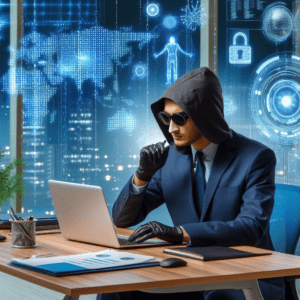
-
Cyber Crime
Bachelor of Vocation (B.Voc) in Cyber Crime is a specialized undergraduate program aimed at providing students with comprehensive training in cybersecurity, digital forensics, and the legal aspects of cybercrime investigation and prevention. This program equips students with the technical skills, legal knowledge, and ethical understanding necessary to combat cyber threats and protect digital assets. Below is a detailed description of the program:
- Duration: The B.Voc program in Cyber Crime typically spans three years, divided into semesters.
- Curriculum: The curriculum is designed to provide a multidisciplinary approach, covering technical, legal, and ethical aspects of cybercrime. It encompasses subjects related to cybersecurity, digital forensics, criminal law, criminal procedure, and information technology.
- Practical Training: Emphasis is placed on hands-on training through lab exercises, simulations, case studies, and real-world scenarios. Students work with industry-standard tools and techniques to analyze cyber threats, investigate digital crimes, and implement security measures.
- Industry Alignment: The curriculum is regularly updated to align with industry standards, best practices, and emerging technologies. Collaboration with cybersecurity professionals, law enforcement agencies, and legal experts ensures that students are equipped with relevant skills and knowledge.
- Legal and Ethical Considerations: The program emphasizes the importance of ethical behavior, legal compliance, and respect for privacy rights in cybersecurity and digital forensics. Students learn about the legal framework governing cybercrime investigations, digital evidence handling, and prosecution.
- Core Subjects:
– Introduction to Cybersecurity
– Network Security
– Cryptography and Encryption
– Digital Forensics Fundamentals
– Incident Response and Recovery
– Cyber Law and Ethics
– Cybercrime Investigation Techniques
– Malware Analysis and Reverse Engineering
– Cyber Threat Intelligence - Specialization Electives:
– Advanced Digital Forensics
– Penetration Testing and Ethical Hacking
– Mobile Device Forensics
– Cloud Security
– Cybersecurity Risk Management
– Cyber Insurance and Compliance
– Cybersecurity Governance and Policy - Software Tools and Technologies:
– Wireshark
– EnCase Forensic
– FTK Imager
– Volatility Framework
– Metasploit
– Nessus
– Snort
– Splunk - Legal and Regulatory Framework:
– Cybercrime Laws and Regulations
– Digital Evidence and Chain of Custody
– Cyber Ethics and Privacy Rights
– Cybersecurity Compliance Standards (e.g., GDPR, HIPAA, PCI DSS) - Practical Projects and Internships:
- Students undertake hands-on projects and internships in cybersecurity firms, law enforcement agencies, or corporate IT departments.
- Practical experience in conducting cyber investigations, analyzing digital evidence, and implementing security controls enhances students’ employability and prepares them for real-world challenges.
- Technical Proficiency: Mastery of cybersecurity tools, techniques, and methodologies for threat detection, analysis, and response.
- Analytical Skills: Ability to analyze complex cyber incidents, identify patterns, and formulate effective response strategies.
- Attention to Detail: Thorough examination and documentation of digital evidence while maintaining chain of custody.
- Communication Skills: Clear and concise communication of technical findings and recommendations to stakeholders with varying levels of expertise.
- Legal and Ethical Understanding: Knowledge of cybercrime laws, regulations, and ethical principles governing digital investigations and cybersecurity practices.
- Problem-Solving: Creative problem-solving to address cybersecurity challenges and mitigate risks effectively.
- Teamwork and Collaboration: Working collaboratively with cross-functional teams to address cybersecurity threats and protect organizational assets.
- Cybersecurity Analyst: Identifying, analyzing, and mitigating cyber threats to protect organizations’ digital assets.
- Digital Forensic Examiner: Collecting, preserving, and analyzing digital evidence for use in legal proceedings.
- Incident Responder: Responding to cybersecurity incidents, coordinating response efforts, and minimizing damage.
- Security Consultant: Advising organizations on cybersecurity best practices, risk management, and compliance.
- Penetration Tester: Assessing the security posture of systems and networks by simulating cyber attacks and identifying vulnerabilities.
- Cybercrime Investigator: Investigating cybercrimes such as hacking, data breaches, identity theft, and online fraud.
- Compliance Officer: Ensuring that organizations comply with cybersecurity laws, regulations, and industry standards.
B.Voc in Cyber Crime is a comprehensive program that prepares students for careers in cybersecurity, digital forensics, and cybercrime investigation. By providing a blend of technical expertise, legal knowledge, and ethical understanding, the program equips graduates with the skills necessary to safeguard digital assets, combat cyber threats, and uphold the rule of law in cyberspace. With a strong emphasis on practical training, industry collaboration, and ethical conduct, graduates are well-prepared to pursue rewarding careers in the rapidly evolving field of cybersecurity and digital forensics.
